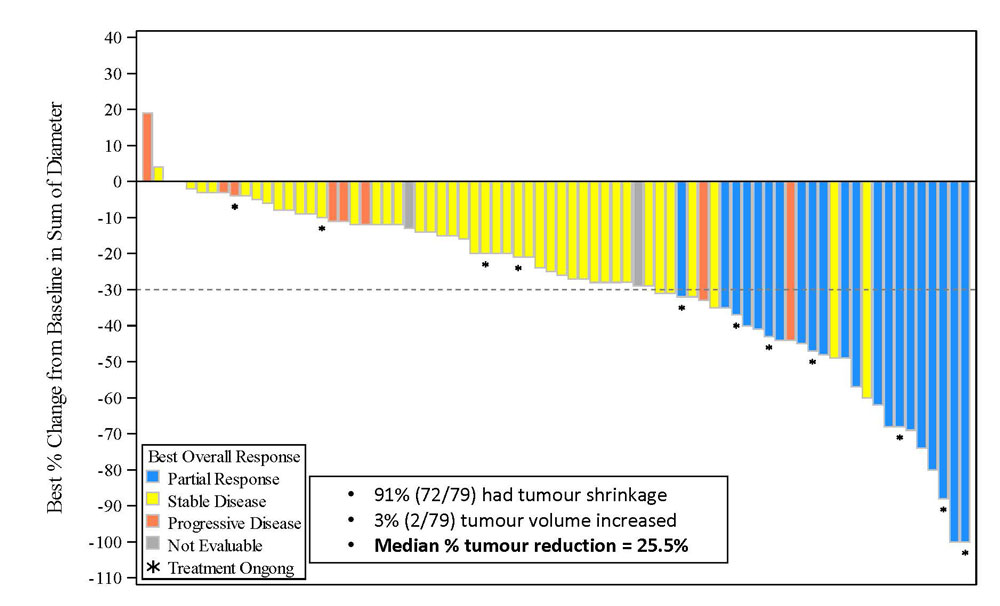Patients with epidermal growth factor receptor (EGFR) exon 20 mutant metastatic non-small cell lung cancer (NSCLC) showed clinical benefit and tolerable safety following treatment with poziotinib according to findings presented at the ESMO Targeted Anticancer Therapies (TAT) Virtual Congress 2021 held on 1-2 March. Further study of poziotinib in patients with metastatic NSCLC and EGFR or HER2 exon 20 mutations showed that the safety profile could be improved by twice daily dosing.
Lead author Adrian Sacher of the Medical Oncology and Haematology Department, Princess Margaret Cancer Centre in Toronto, Canada, discussed how effective treatment of patients with metastatic NSCLC harbouring EGFR or HER2 exon 20 insertion mutations represents a critical unmet need. He explained that poziotinib, a potent, irreversible, tyrosine kinase inhibitor (TKI), has a half-life of 7.2 hours and pharmacokinetic modelling suggests that tolerability may be improved with a twice daily dosing schedule.
Therefore, poziotinib is being studied in the multi-cohort phase II ZENITH20 (NCT03318939) study and efficacy data from once daily poziotinib in treatment naïve patients as well as exploratory data from twice daily dosing were presented. The ZENITH20-Cohort 3 enrolled 79 treatment-naïve patients with metastatic NSCLC and EGFR exon 20 mutations who were treated with poziotinib at 16 mg daily, whereas the ZENITH20-Cohort 5 treated 40 patients with NSCLC and EGFR or HER2 exon 20 mutations in randomised arms of poziotinib at 10, 12, or 16 mg daily and at 6 or 8 mg twice daily.
The endpoints were objective response rate (ORR) per RECIST v1.1, duration of response (DoR), progression-free-survival (PFS) and safety.
Most of the patients demonstrated tumour reduction in ZENITH20-Cohort 3
Of the 79 patients participating in ZENITH20-3, twelve patients remained on treatment with median follow up of 9.2 months. A response was observed in 22 patients for an ORR of 27.8% (95% confidence interval [CI] 18.4–39.1%) and disease control rate was 86.1%.
The median DoR was 6.5 months. Overall, 91% of patients in the intent-to-treat analysis showed tumour reduction. The median PFS was 7.2 months.
The adverse event (AE) profile was similar to that observed with second generation EGFR TKIs; ≥ grade 3 rash occurred in 33% of patients and diarrhoea in 23%.
ZENITH20-Cohort 5 showed that AEs could be reduced with twice daily dosing
Regarding the ZENITH20-Cohort 5, preliminary data from the randomised arms of daily versus twice daily dosing indicate that the rates of expected AEs was lower with twice daily dosing. The AE rates were 31% with 16 mg daily versus 21% with 8 mg twice daily dosing and 27% with 12 mg daily versus 16% with 6 mg twice daily dosing.
Data from cycle 1 showed that twice daily 8 and 6 mg dosing schedules provided a relative reduction in dose interruptions by 38% and 52%, respectively. Dr. Sacher also presented updated safety, tolerability and preliminary efficacy data during the session.
Conclusions
The authors concluded that these data demonstrate that poziotinib has clinically meaningful activity in treatment-naïve patients with metastatic NSCLC and EGFR exon 20 mutations at 16 mg daily dosing. Furthermore, their preliminary data suggests improved tolerability and safety with a twice daily dosing strategy that warrants further evaluation.
This study was funded by Spectrum Pharmaceuticals.
Reference
36MO – Sacher A, Le X, Cornelissen R, et al. Safety, tolerability and preliminary efficacy of poziotinib with twice daily strategy in EGFR/HER2 Exon 20 mutant non-small cell lung cancer. ESMO Targeted Anticancer Therapies (TAT) Virtual Congress (1-2 March 2021).

